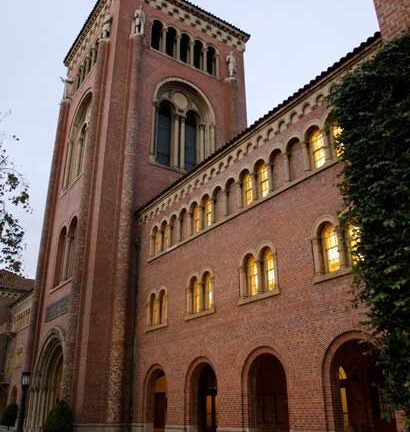
USC ranks fourth in the world among all foundation grant recipients. (USC Photo/Dietmar Quistorf)
USC leads in foundation grants
In the middle of a campaign with a record-setting goal, USC fundraising has achieved another high mark: first in foundation support among all U.S. universities.
USC netted $194 million in foundation grants for fiscal year 2011, the most recent for which data is available, outstripping Stanford University’s $129 million, Duke’s $123 million and Harvard’s $119 million. The Foundation Center, the leading source of information about philanthropy worldwide, confirmed USC’s No. 1 ranking in its latest survey of top foundations and recipients.
USC stands out both for the size and breadth of its support. The university ranks fourth in the world among all foundation grant recipients, with the top three — the Global Alliance for Vaccines and Immunization, the Global Fund to Fight AIDS, Tuberculosis and Malaria, and The Walton Family Charitable Support Foundation — owing their standing to very large grants from a single source, such as the Bill & Melinda Gates Foundation.
By contrast, USC received 155 grants from dozens of foundations in a single year. These included funders well-known to USC faculty and students for their endowment of schools, such as the Annenberg and W.M. Keck foundations, as well as other prominent local and national foundations, including The Ahmanson Foundation, California Community Foundation, California Endowment and The Rose Hills Foundation.
“Our Foundation Center ranking reflects the deep support USC is fortunate to receive from so many different philanthropic foundations for our outstanding academic programs and transformative faculty,” said Al Checcio, senior vice president for University Advancement.
Linda Zukowski, executive director of corporate and foundation relations for USC, attributed the university’s success to years of methodical effort by her colleagues.
“We have very skilled foundation officers in the university,” she said. “There’s no magic to foundation grant writing. It’s basic blocking and tackling — research, relationship building, reporting, writing and rewriting. It’s a lot of hard work.”
Zukowski also credited the development of a donor management system where every foundation is assigned a primary relationship manager within the university and the establishment in recent years of a central database for tracking all contact with foundations.
Geography played a part as well: “We’re lucky in that we have a handful of very large and very generous foundations in the Los Angeles area,” she said.
Among the ways in which foundation support contributes to research and education at USC:
- The Rose Hills Foundation will provide a total of $775,000 over three years in seed research funding to USC assistant professors in the fields of science, technology, engineering and mathematics.
- The USC School of Social Work recently received $650,000 from the Iraq Afghanistan Deployment Impact Fund of the California Community Foundation for a research, training and policy development project on veterans’ issues.
- The Toyota USA Foundation awarded $600,000 to USC’s Neighborhood Academic Initiative for a hands-on science instruction program for students and teachers in junior and senior high schools surrounding the University Park Campus.
- The John Randolph Haynes and Dora Haynes Foundation awarded grants totaling more than $500,000 to the USC Price School of Public Policy to support faculty research in demographics, transportation and water scarcity in Southern California.
- For more than a decade, the Unihealth Foundation has awarded multiple grants totaling more than $8 million to the Keck School of Medicine of USC for cancer research and patient services.
- Grants to the USC Annenberg School for Communication and Journalism from the Gates Foundation and the John S. and James L. Knight Foundation, totaling $5.75 million, will fund research by faculty at The Norman Lear Center focused on developing a deeper understanding of media’s influence on social trends and individual behavior.
- Since the 1970s, the Charles Lee Powell Foundation has awarded grants totaling more than $20 million to the USC Viterbi School of Engineering to support a building, a photonics lab, three endowed faculty chairs and fellowships. The foundation also provides an annual cash award of $400,000 for faculty research and equipment.
The Foundation Center publishes its Key Facts on U.S. Foundations report every fall. The report documents the overall size of the U.S. foundation community and provides perspective on the giving priorities of the nation’s largest foundations. The data above came from the 2013 report and was based on all grants of $10,000 or more awarded by a sample of the top 1,000 foundations by giving.
For more information, visit data.foundationcenter.org or http://foundationcenter.org/media/news/20131001.html
